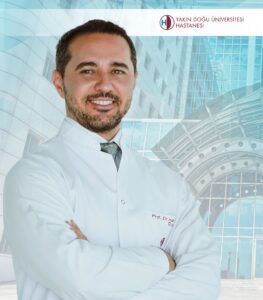
Reminding that two separate traffic accidents that occurred in Kyrenia and Kilitkaya were due to heart disease, Near East University Hospital Cardiology Department Head Prof. Dr. Hamza Duygu stated that everyone over the age of 30 should have a regular heart check-up once a year.
This week, two people lost their lives in two separate traffic accidents that occurred in Kyrenia and Kilitkaya. Autopsy reports announced by the Police Press Office revealed that both accidents were related to heart disease. All these deaths brought sudden deaths due to cardiovascular diseases to the agenda once again.
Near East University Hospital Cardiology Department Head Prof. Dr. Hamza Duygu drew attention to the fact that a large portion of the society is unaware of heart diseases that do not show any symptoms in advance and cause sudden deaths.
Emphasizing that cardiovascular diseases are the most common causes of death in Northern Cyprus, Prof. Dr. Duygu also warned that the frequency of sudden deaths seen in people with no diagnosed disease has increased in recent years.
Deaths that occur due to cardiac arrest shortly after the onset of complaints are defined as “Sudden Cardiac Death”. Prof. Dr. Hamza Duygu stated that this situation often occurs when fatal rhythm disorders occur, and that the reason why death occurs within at least 1 or 2 hours is usually due to arrhythmia problems. Prof. Dr. Duygu draws attention to the fact that in deaths that occur within long hours, heart function is impaired and pump failure occurs in the heart.
Have a regular heart check-up every year starting at the age of 30
Stating that the main cause of sudden cardiac death is heart attack due to coronary artery occlusion, Prof. Dr. Hamza Duygu stated that death is usually caused by heart rhythm disorder that develops during a heart attack. Prof. Dr. Hamza Duygu also added: “During this fatal rhythm disorder called ventricular fibrillation, the heart cannot perform its pumping function and blood flow is cut off. If the heart rhythm is not returned to normal within minutes by applying an electric shock, death occurs. Therefore, conditions such as hypertension, diabetes, high cholesterol, smoking and family history, which increase the risk of coronary artery disease, are also risk factors for sudden cardiac death.”
Stating that the most common symptoms before the development of sudden cardiac symptoms are shortness of breath, palpitations, darkening of the eyes and feeling faint, Prof. Dr. Hamza Duygu stated that sometimes the heart can suddenly stop without any symptoms. Prof. Dr. Hamza Duygu stated that everyone over the age of 30 should undergo regular heart health screenings once a year in order to protect themselves from the bad results that heart diseases that do not previously show any symptoms will cause.

Reminding that especially people with a history of sudden cardiac death in their family should definitely go to a fully equipped hospital as soon as possible, Prof. Dr. Hamza Duygu emphasized that pilots, drivers, security officers and athletes who carry great responsibility due to their jobs should regularly undergo a detailed heart health screening program. Prof. Dr. Duygu stated that conditions that cause sudden death such as coronary artery occlusion, aortic dilatation, arrhythmia, heart failure, congenital heart disease can be detected and sudden cardiac death can be prevented with early diagnosis. Prof. Dr. Hamza Duygu continued as follows: “It is possible to prevent some cases by having regular health checks. Rare familial genetic diseases can cause sudden death in healthy young individuals. In this respect, high-risk patients can be detected with various diagnostic methods. It is of great importance that those who have lost their close relatives to unexpected sudden deaths are evaluated in a cardiology center.”
Conditions that Increase the Risk of Sudden Cardiac Death;
Cardiovascular occlusions and related heart attacks
Aortic artery rupture
Pulmonary embolism
Heart failure, congenital heart muscle diseases
Heart valve diseases
Inflammation of the heart muscle
Congenital heart diseases
Toxic substance use
Some serious rhythm disorders (long QT syndrome, short QT syndrome, WPW syndrome, Brugada syndrome, arrhythmogenic right ventricular dysplasia)